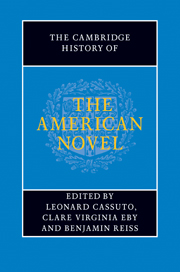Book contents
- Frontmatter
- General Introduction
- PART ONE INVENTING THE AMERICAN NOVEL
- Introduction: inventing the American novel
- 1 Transatlantic currents and the invention of the American novel
- 2 Susanna Rowson, Hannah Webster Foster, and the seduction novel in the early US
- 3 Charles Brockden Brown and the novels of the early republic
- 4 The novel in the antebellum book market
- 5 American land, American landscape, American novels
- 6 Cooper and the idea of the Indian
- 7 The nineteenth-century historical novel
- 8 Hawthorne and the aesthetics of American romance
- 9 Melville and the novel of the sea
- 10 Religion and the nineteenth-century American novel
- 11 Manhood and the early American novel
- 12 Sentimentalism
- 13 Supernatural novels
- 14 Imagining the South
- 15 Stowe, race, and the antebellum American novel
- 16 The early African American novel
- PART TWO REALISM, PROTEST, ACCOMMODATION
- PART THREE MODERNISM AND BEYOND
- PART FOUR CONTEMPORARY FORMATIONS
- A selected bibliography
- Index
3 - Charles Brockden Brown and the novels of the early republic
from PART ONE - INVENTING THE AMERICAN NOVEL
Published online by Cambridge University Press: 28 July 2011
- Frontmatter
- General Introduction
- PART ONE INVENTING THE AMERICAN NOVEL
- Introduction: inventing the American novel
- 1 Transatlantic currents and the invention of the American novel
- 2 Susanna Rowson, Hannah Webster Foster, and the seduction novel in the early US
- 3 Charles Brockden Brown and the novels of the early republic
- 4 The novel in the antebellum book market
- 5 American land, American landscape, American novels
- 6 Cooper and the idea of the Indian
- 7 The nineteenth-century historical novel
- 8 Hawthorne and the aesthetics of American romance
- 9 Melville and the novel of the sea
- 10 Religion and the nineteenth-century American novel
- 11 Manhood and the early American novel
- 12 Sentimentalism
- 13 Supernatural novels
- 14 Imagining the South
- 15 Stowe, race, and the antebellum American novel
- 16 The early African American novel
- PART TWO REALISM, PROTEST, ACCOMMODATION
- PART THREE MODERNISM AND BEYOND
- PART FOUR CONTEMPORARY FORMATIONS
- A selected bibliography
- Index
Summary
Shortly after the close of the American Revolution – at first in magazines, beginning with Jeremy Belknap's nationalist allegory The Foresters, serialized in Philadelphia's Columbian Magazine in 1787, and soon following in book form, beginning with William Hill Brown's The Power of Sympathy in 1789 – American writers and printers unleashed a surge of native fiction that often but not always self-identified as “novels.” Although this surge gained momentum through the turn of the century, domestic productions in the novel still did not come close to rivaling the numbers and popularity of foreign imports and reprints available from booksellers and circulating libraries. As Paul Giles indicates in this volume, accounts of the American novel – whether nationalist accounts or accounts of developing nationalism – that fail to consider the totality of writing consumed by early American readers inevitably fail to comprehend the character of these first American fictions.
The tendency toward reading the “national” over other contexts has been particularly true of critics of Charles Brockden Brown (1771–1810), a Philadelphia native born to Quaker parents on the eve of the war. Brown's six novels – published between 1798 and 1801 – have most often been treated by literary historians as indices of American character, political con.ict, and nascent nationalism. Such approaches often take writers rather than readers as key subjects, making Brown one among a handful of writers who advocated – successfully or not – for some distinctively American traits in the new nation's literary productions; they also take for granted Brown's status as representative of an incipient “American novel” tradition and, at times, of the new nation's public sphere or literary culture as a whole.
- Type
- Chapter
- Information
- The Cambridge History of the American Novel , pp. 51 - 66Publisher: Cambridge University PressPrint publication year: 2011



